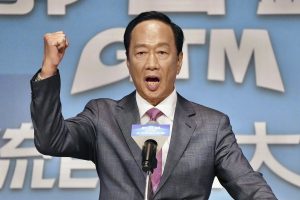Terry Gou, who founded Apple supplier Foxconn, said Monday he will run as an independent candidate in Taiwan’s presidential election, ending months of speculation.
At a news conference, Gou criticized the governing Democratic Progressive Party, saying its policies have “brought Taiwan into the risk of war” with China, which claims the self-ruled island democracy as part of its territory.
“I will definitely not allow Taiwan to become the next Ukraine,” he added.
He said Taiwan also needs new approaches on the economy and other matters at home. “Domestically, the national policy direction is filled with all sorts of mistakes. There’s no way to solve the difficulties of Taiwanese industry and people’s livelihoods,” he said.
Gou’s Foxconn, formally known as Hon Hai Precision Industry Co., is a major supplier to Apple and has many factories in China that manufacture iPhones.
Ideologically, Gou is most in line with the Kuomintang (KMT), the opposition party that is friendly to China. The party holds that Taiwan and China are part of one country, called the Republic of China. The KMT ruled over China in the early half of the 20th century before they lost a civil war to the Communist Party. They retreated to Taiwan in 1949, where they vowed to one day retake the republic.
Gou has long had presidential aspirations. He lost in the KMT primary in 2019 and tried again this year, but the party selected New Taipei City Mayor Hou Yu-ih as its candidate. Back in May, Gou said on his Facebook page that he would support Hou’s candidacy.
However, since then he has continued to act like a presidential candidate himself, appearing at political rallies and even publishing an op-ed on Taiwan’s foreign policy in the Washington Post. Gou’s announcement thus confirmed widespread speculation that he would attempt to seek the presidency as an independent candidate.
Since he is running without the backing of a major political party, Gou must gather public signatures to qualify for the ballot.
That is a high barrier to meet, as it requires 1.5 percent of the voting population in Taiwan, which is about 290,000 signatures, said Yeh-lih Wang, a professor of politics at National Taiwan University.
Even if he reaches that goal, experts say Gou is unlikely to become a frontrunner, as he is joining an already-crowded field.
The other candidates for the January 13 election are former Taipei city mayor Ko Wen-je of the Taiwan People’s Party and current Vice President William Lai of the ruling DPP. Incumbent President Tsai Ing-wen is serving her second term in office and cannot seek another.
Currently, Lai is the front-runner, followed by Ko and then Hou, in various polls.
Gou meanwhile has never garnered more than 20 percent of support in polls that pit him against the other three, said Wang, the political science professor.
“He always thought that he could be the one who would unite the opposition,” though that’s unlikely, Wang said.
Gou said he felt he has something to contribute on the issues that matter to Taiwan’s people.
“I have not seen substantive discussions of policy recently, especially on the topics of cross straits relations (with China), economic development or international relations,” he said.
Gou said he would work for Taiwanese society’s unity because unity was critical to Taiwan’s future.
Gou’s speech emphasized unity because he has received criticism that he was splitting the vote and jeopardizing the opposition’s chances, according to Hsiao Hsu-Tsen, a former deputy secretary-general of the presidential office who often comments on Taiwanese politics. This decision to run is “a demonstration of his political power,” Hsiao said.

































